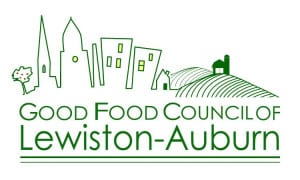
Director of Whiting Farm and Good Food Council of L-A member, Kim Finnerty, being interviewed by local radio station Z105.5 FM in one of their three full greenhouses ready for the start of the gardening season.
AUBURN – Saturday’s wet weather did not dampen the rainbow of color bursting from three full greenhouses with hanging flower baskets, potted herbs, and vegetable seedlings at Whiting Farm. Visitors were there celebrating the spring opening of the Auburn farm and the start of gardening season. Representatives of the Good Food Council of Lewiston-Auburn (GFCLA) were also present to celebrate the first anniversary of the Lewiston-Auburn Community Food Charter.
The L-A Community Food Charter was launched by the GFCLA in Spring of 2016 as a way to highlight L-A’s community food values and build support for a more sustainable local food system. The Food Charter is on the GFCLA website where community members are encouraged to complete a simple form to endorse the one-page Charter and show their commitment to improving the local food system.
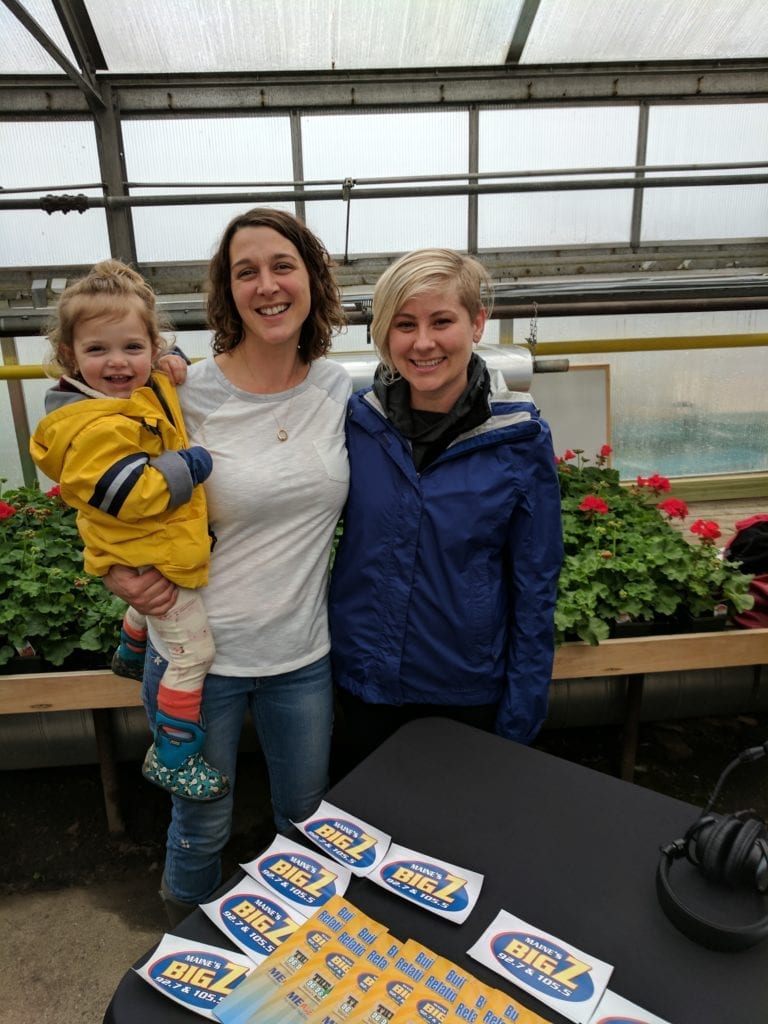
Bolduc, her little helper, and Harper at the Spring Opening of Whiting Farm & Celebration of First Anniversary of the Food Charter.
GFCLA Chair and Director of Food Joy & South Auburn Organic Farm, Karen Bolduc, and GFCLA Coordinator, Julia Harper, were on hand along with Maine’s Big Z105.5 FM to mark the occasion. On behalf of GFCLA, Bolduc and Harper highlighted five activities of L-A area groups who are each an example of “living” the five major Food Charter principles: Food Security, Local and Sustainable Agriculture, Leadership, Good Food Policy, and Working Landscapes and Community Infrastructure.
- Food Security: Auburn’s first Community Garden on Webster Street, made possible by a collaboration between the St. Mary’s Nutrition Center, City of Auburn, the National Park Service River Trails and Conservation Assistance Program, the University of Maine Cooperative Extension, the Androscoggin Land Trust, and Auburn residents.
- Local & Sustainable Agriculture: Somali Bantu Community Association (SBCA) for connecting and supporting over 80 farmers to cultivate agriculture land in the L-A area.
- Leadership: The Center for Wisdom’s Women for their Peasant Pantry community meal program where women in their weekday downtown drop-in center learn how to prepare a healthy subsistence meal from a different culture of the world.
- Good Food Policy: The City of Lewiston for their recent Comprehensive Plan, Legacy Lewiston, for elevating the importance of local agriculture, and listing Community-Supported Agriculture (CSAs), farmers’ markets, and local food movements as priorities for Economic Vitality.
- Working Landscapes & Community Infrastructure: R. Belanger & Son’s Farm for their 200 acres of cultivated land in both Lewiston and Auburn, and maintaining a USDA GAP certified facility, which allows them to be a supplier of “Close to Home” produce in ten area Hannaford Supermarkets.
The first Food Charter principle is “striving for a food-secure future.” As an example of supporting this, Harper described the efforts of the St. Mary’s Nutrition Center, the City of Auburn, and many other partners for a successful collaboration that led to the establishment of Auburn’s first community garden last season. In its first year, twenty-one families and three organizations tended plots in Webster Street Community Garden. An end-of-season survey indicated that 67% of gardeners surveyed reported an increase in household vegetable consumption, 73% reported that they feel more connected to community and neighbors, and 80% reported that they have greater confidence in growing their own food. For more information, check out the Webster Street Community Garden End of Season Report and the facebook page, Community Gardens in Auburn, ME.
As a great example of the second Food Charter principle, “supporting local and sustainable agriculture,” Harper highlighted the Somali Bantu Community Association (SBCA) for connecting and supporting over 80 Bantu farmers to cultivate agriculture land in the L-A area, including 9.6 acres currently leased at Whiting Farm. SBCA is a Lewiston-based non-profit led by Bantu people that provides mutual aid, education, and integration services to their members.
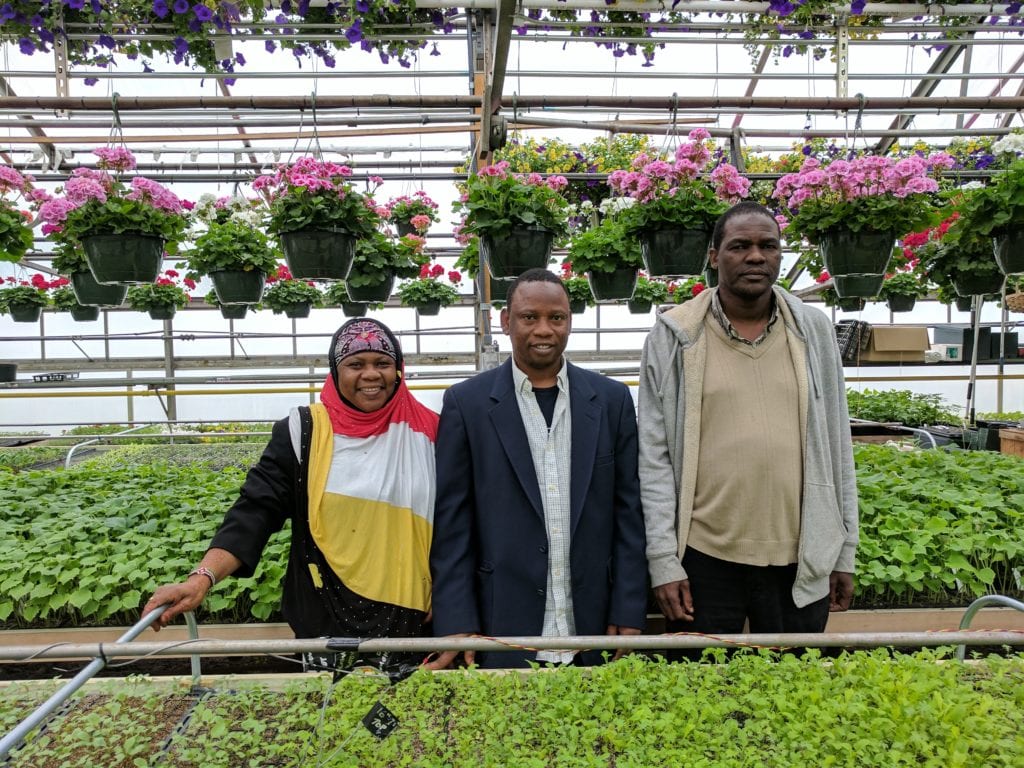
Somali Bantu Community Association (SBCA) members and farmers check on the progress of
their vegetable seedlings at Whiting Farm’s Spring Opening and First Anniversary of the L-A
Community Food Charter on Saturday, May 6. From R to L are Khadija Ibrahim, SBCA Farmer,
Muhidin Libah, SBCA Executive Director, and Hassan Barjim, SBCA Farmer.
The third Food Charter principle encourages “enabling leadership by all members of the community” and as an example, Bolduc highlighted the Center for Wisdom’s Women (CWW) for their Peasant Pantry community meal program. The CWW is a weekday drop-in center in downtown Lewiston that helps women break isolation and build community. Peasant Pantry is a once monthly prepared basic meal from a different culture of the world. Each month the women at the CWW prepare this meal, learn about the food they are preparing, and the culture whose food they are eating. The prepared meal is open to anyone in the community, people pay what they can and any extra income is given to the team of women that prepared the meal.
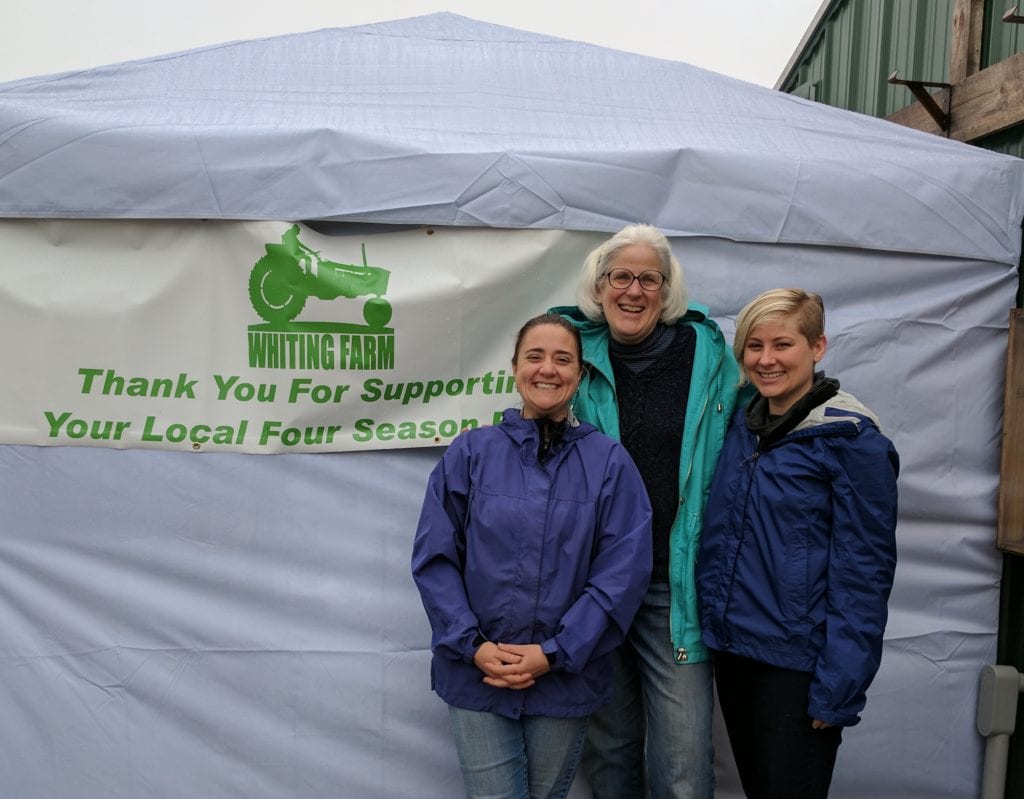
Klara Tammany, Executive Director of the Center for Wisdom’s Women (Center), with Kim Finnerty, Director of Whiting Farm and GFCLA member, (Left) and Julia Harper, Coordinator of the GFCLA (Right).
The fourth principle of the Food Charter is “elevating good food policy” and Bolduc recognized The City of Lewiston for their recent Comprehensive Plan, Legacy Lewiston, for speaking to the necessity of protecting rural lands from development for use of agriculture. The plan also indicates that CSAs, farmers’ markets, and local food movements are elements that should be prioritized to create Economic Vitality. GFCLA is thrilled by this important step in Lewiston’s policy surrounding good food.
The last principle of the Food Charter is “preserving working landscapes,” or farms, and “development of community infrastructure” and as an example, Harper recognized R. Belanger & Son’s Farm for continuing a third generation family farm that has 200 acres of cultivated land in both Lewiston and Auburn, and provides jobs that support 17 families. They are also an example of supporting successful community infrastructure by maintaining a USDA GAP certified facility, which allows them to be a supplier of “Close to Home” produce in ten area Hannaford Supermarkets. As such, they are one of the area leaders in farming for wholesale. This gives local supermarket shoppers the option to purchase truly local food.
These five examples represent only a small fraction of the good food work being done in the LA area, and Bolduc remarked, “We want to celebrate all of it. It’s also all part of a statewide movement to build a more resilient Maine food system.”
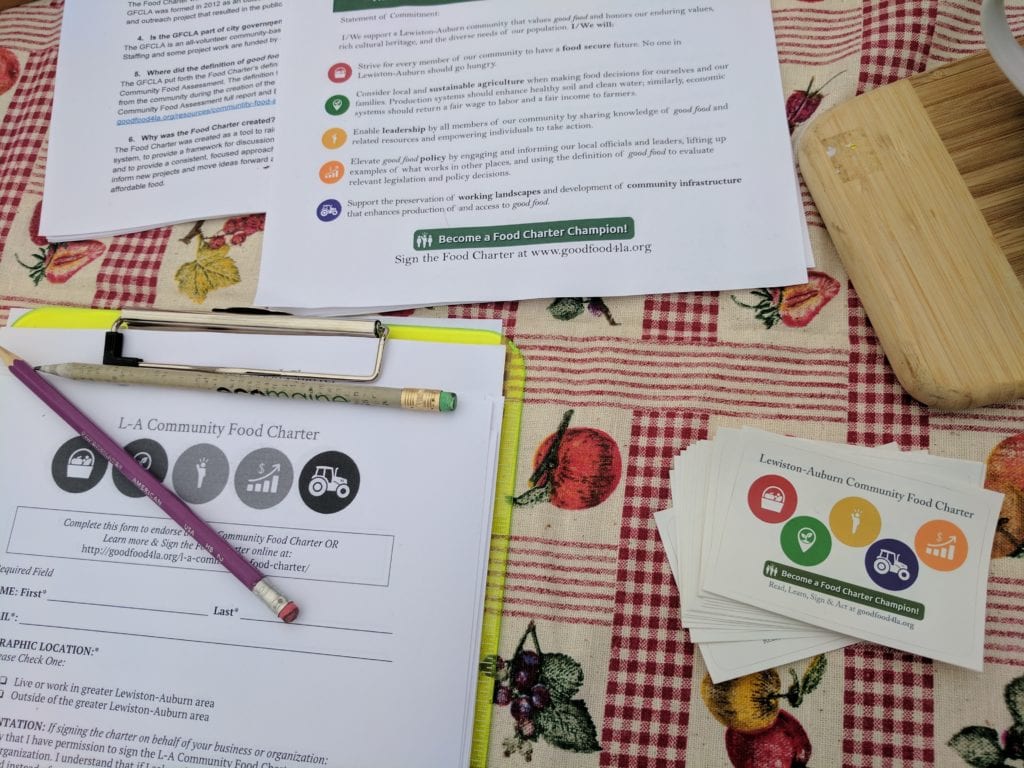
L-A Community Food Charter sign-ups were available at the GFCLA table in the vendor fair. 25 new people signed the Food Charter at the event.
Those interested in learning more about the L-A Community Food Charter are invited to visit the GFCLA website at goodfood4la.org.
